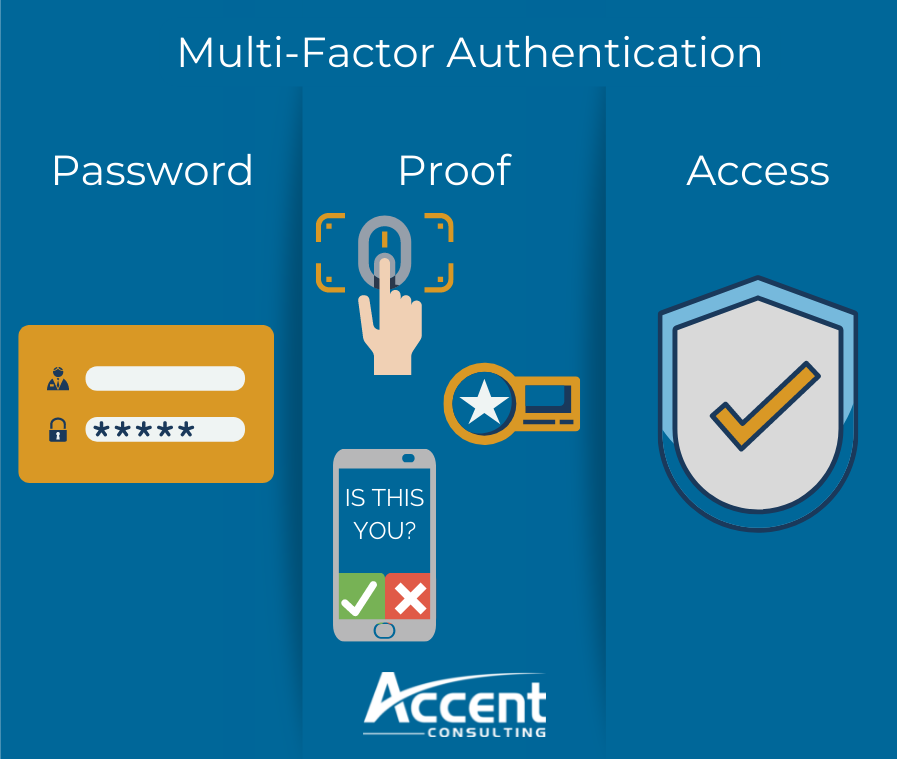Defining Multi-Factor Authentication and What It Can Do To Protect Your Business
Published: February 24th, 2022
Multi-Factor Authentication is a must for your business. Traditional passwords are no longer secure enough on their own. Workers have to remember so many passwords that most tend to reuse simple and easy to remember phrases, such as “qwerty” or “password.” Weak passwords are a major contributor in 81% of security breaches. Cyber attacks have become increasingly sophisticated in recent years, making basic credentials easy to steal and allowing criminals to gain unauthorized access to your sensitive information. Business owners are responsible for making sure their accounts are secure, in order to protect customers’ personal information, records, and payment from being stolen.
What Is Multi-Factor Authentication?
Multi-Factor Authentication (MFA) is an electronic authentication method that requires two or more verification factors to allow access into an account. The verification factors used have to include at least two of three different pieces of evidence: knowledge, possession, or inherence. Breaking it down, the evidence of knowledge is proven by something only the user knows, like their password. The evidence of possession is proven with something only the user has, like using their cell phone to approve a notification. Finally, the evidence of inherence is proven with something only the user is, like a scan of their fingerprint or voice recognition. So, when logging in to an account using MFA, you could be required to sign in using your password and then approve a notification on your phone. This particular practice is even more secure when you have your phone protected with another password, a fingerprint, or facial scan.

What Can MFA Do To Protect Your Business?
Requiring users to identify themselves with more than just a username and password will enhance your organizations security. Login information alone is vulnerable and can be easily stolen by cybercriminals. MFA protects your organization and its users even if passwords are stolen. With the rise of remote work, MFA adds an additional layer of protection when workers are on their home networks or personal devices that aren’t as secure. Compliance also plays a significant role in the benefits of multi-factor authentication. If an organization handles and/or stores sensitive data such as personal addresses or financial information, it is likely that they are required to have strong authentication processes. The Sarbanes-Oxley Act (SOX) and the Health Insurance Portability and Accountability Act (HIPAA) require all publicly traded companies and healthcare businesses, respectively, to comply with identity and access management regulations. MFA provides that extra security needed to help maintain compliance.
Accent Consulting can help you implement Multi-factor Authentications to ensure that your sensitive data is safe and secure. Call 877.426.1337 to speak with our IT professionals about MFA setup.
Reach Out To Us
Recent Posts
-
 3 Reasons Why SMBs Can’t Afford to Ignore AIMay 21, 2025/0 Comments
3 Reasons Why SMBs Can’t Afford to Ignore AIMay 21, 2025/0 Comments -

-

-
 DeepSeek: Unlocking the Future of Business Decision-MakingJanuary 30, 2025/
DeepSeek: Unlocking the Future of Business Decision-MakingJanuary 30, 2025/ -
 How Local IT Support Powers Ag Business Success in IndianaJanuary 16, 2025/
How Local IT Support Powers Ag Business Success in IndianaJanuary 16, 2025/ -
 Transform Your Business in 2025: 5 Must-Have Tech ResolutionsJanuary 6, 2025/
Transform Your Business in 2025: 5 Must-Have Tech ResolutionsJanuary 6, 2025/ -
 Accent Consulting’s Annual Holiday Party 2024December 11, 2024/
Accent Consulting’s Annual Holiday Party 2024December 11, 2024/
Schedule a Free Network Assessment
A network assessment is an in-depth analysis of your current IT infrastructure that provides you with a comprehensive understanding of your existing environment and recommends improvements such as network consolidation, simplification, or automation.
Learn More
